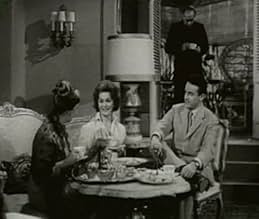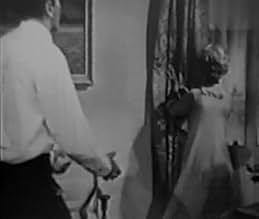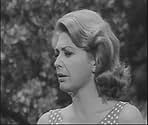Una colección de historias sobre eventos paranormales, un folclore espeluznante y el mundo de lo desconocido.Una colección de historias sobre eventos paranormales, un folclore espeluznante y el mundo de lo desconocido.Una colección de historias sobre eventos paranormales, un folclore espeluznante y el mundo de lo desconocido.
Explorar episodios
Reseñas destacadas
There have been so many comparisons between this show and The Twilight Zone I may as well add my own two cents on the subject. These two shows were both hosted and created by men who had been active in live television. Rod Serling had been one of the top writers of the live so-called "golden age" of TV drama in the fifties, while John Newland had been a prominent actor on the small screen during the same period. Alcoa Presents (rerun as One Step Step Beyond, and best-remembered by this title) actually preceded the Zone by half a second, and ran for less than three full years. TZ has a bigger cult audience, but OSB (as I prefer to call it), has its admirers, of which I am one.
The Zone was liberal in tone, dark and moody in its photographic style. Its set designs, particularly its street scenes, were reminiscent of film noir. While the Zone's stories were all fiction, many adapted from short stories, OSB's producers claimed that its stories were all based on fact. The different styles of the two shows can be seen in the way their hosts presented themselves. Serling was dark, intense, urban and verbose. Newland was light, mild, laconic and somewhat effete. While Serling seemed like the sort of guy you'd see at the ballpark or at the fights, Newland was the kind of guy one might expect to turn up at the opera. Serling came off as very American in all respects, while Newland could almost pass as British.
OSB presented each episode as if it were the truth, only slightly dramatized. There was nothing on the surface to suggest that the show was in any way about the supernatural or ESP. The sets were unimaginative, prosaic, and often seemed flooded with light; as the overall visual style of the series was not that different from a commercial,--or an episode of the Loretta Young Show. What made the shows creepy were the acting, which was often excellent, and Harry Lubin's eerie, otherworldly music, which kicked in whenever something weird was happening. The actors tended to react to the strange goings-on realistically,--as it they were choking to death, had just seen a ghost, talked to a dead person or had witnessed a murder that had happened twenty years earlier--and the "startle reactions" on the faces of the players, plus Lubin's beyond the grave music, could send chills down one spine. This was a million miles from the often sentimental and didactic Zone, which seldom went for straight horror, straight sci-fi or straight anything unless there was a "meaning" (i.e. a point, a lesson), while the only lesson one learned from OSB was that "such things exist, such things happen". Chilling television, this was, and story-telling with a vengeance. "You want meaning?", Newland seemed to ask the viewer after each episode, "Go find it for yourself. My job is to give you the facts".
The Zone was liberal in tone, dark and moody in its photographic style. Its set designs, particularly its street scenes, were reminiscent of film noir. While the Zone's stories were all fiction, many adapted from short stories, OSB's producers claimed that its stories were all based on fact. The different styles of the two shows can be seen in the way their hosts presented themselves. Serling was dark, intense, urban and verbose. Newland was light, mild, laconic and somewhat effete. While Serling seemed like the sort of guy you'd see at the ballpark or at the fights, Newland was the kind of guy one might expect to turn up at the opera. Serling came off as very American in all respects, while Newland could almost pass as British.
OSB presented each episode as if it were the truth, only slightly dramatized. There was nothing on the surface to suggest that the show was in any way about the supernatural or ESP. The sets were unimaginative, prosaic, and often seemed flooded with light; as the overall visual style of the series was not that different from a commercial,--or an episode of the Loretta Young Show. What made the shows creepy were the acting, which was often excellent, and Harry Lubin's eerie, otherworldly music, which kicked in whenever something weird was happening. The actors tended to react to the strange goings-on realistically,--as it they were choking to death, had just seen a ghost, talked to a dead person or had witnessed a murder that had happened twenty years earlier--and the "startle reactions" on the faces of the players, plus Lubin's beyond the grave music, could send chills down one spine. This was a million miles from the often sentimental and didactic Zone, which seldom went for straight horror, straight sci-fi or straight anything unless there was a "meaning" (i.e. a point, a lesson), while the only lesson one learned from OSB was that "such things exist, such things happen". Chilling television, this was, and story-telling with a vengeance. "You want meaning?", Newland seemed to ask the viewer after each episode, "Go find it for yourself. My job is to give you the facts".
10penwil09
I am a connoisseur of "horror" movies/series, and have seen them all since the 1950s, but One Step Beyond remains the scariest of all the series. The only one that came close was Boris Karloffs'-Thriller! John Newlands' beginning monologue reels you in, to have you gripping the arms of your chair during the story, too scared out of your wits to even move, then having the story ending to Mr.Newlands epilogue to further heighten your anxiety of being too fearful to go to sleep!! Unlike..Twilight Zone, Hitchcock, Night Gallery,Tales from the Crypt, Outer Limits and X-Files which ALL have humorous episodes which discount their "scare-quotient", and leaves you disappointed....however "O.S.B."satisfies the most discriminating of "scary-movie" tastes !!! O.S.B never had one "hokey" episode that would tickle your funny bone and that is what makes for excellent scare tactics. I wish they had this series on DVD !!!
Anyone who has ever had a chance to see any of the original episodes of One Step Beyond has truly experienced great television, the way it should be even today in our so called "state of the art" world.
It really doesn't take a whole lot to make a great, convincing program. The mood and music and stories behind each episode is disturbing even now. My hubby found a 2 CD box set of the series that only cost us $5.00! But what great episodes they are. I would really like to own all of the series, if they are still available.
Once again, One Step Beyond was real television. Forget about the new reality shows of today. I'll gladly take one step beyond back to the way real great t.v. shows were meant to be.
It really doesn't take a whole lot to make a great, convincing program. The mood and music and stories behind each episode is disturbing even now. My hubby found a 2 CD box set of the series that only cost us $5.00! But what great episodes they are. I would really like to own all of the series, if they are still available.
Once again, One Step Beyond was real television. Forget about the new reality shows of today. I'll gladly take one step beyond back to the way real great t.v. shows were meant to be.
One commenter offered the proposition that "The Twilight Zone" was not a very good show and "One Step Beyond" was much better. There is truth to the latter statement. Step was a truly wonderful show, and I might add, MUCH freakier and scarier to a little kid. "The Burning Girl" episode killed me. And the one they did about the San Francisco earthquake was awesome. Suffice it to say that I spent a few nights awake wondering about this stuff. Unlike the Twilight Zone, Step featured stories that were somewhat based in fact, or at least believable to people who believe. But I have to take the original poster to task. He made it sound as if Twilight Zone sucked. I can assure you, it did not.
These shows aired when television was still in it's infancy. As was the writing, the directing, the acting and all that goes with it. In both cases, there were experiments. Nobody knew how it would turn out. But one thing is certain. BOTH shows helped to create the sci-fi dramas we accept as so commonplace today. There was NOTHING commonplace about the "Willoughby" episode of the Twilight Zone. Nor was there anything commonplace about the Burning Girl episode of One Step Beyond. They were both wonderful shows that broke ground for the future. That being said, when are the One Step Beyond episodes coming back for viewing? I sure miss them.
These shows aired when television was still in it's infancy. As was the writing, the directing, the acting and all that goes with it. In both cases, there were experiments. Nobody knew how it would turn out. But one thing is certain. BOTH shows helped to create the sci-fi dramas we accept as so commonplace today. There was NOTHING commonplace about the "Willoughby" episode of the Twilight Zone. Nor was there anything commonplace about the Burning Girl episode of One Step Beyond. They were both wonderful shows that broke ground for the future. That being said, when are the One Step Beyond episodes coming back for viewing? I sure miss them.
This is a show that never gets the respect or attention of its' better known relatives, "The Twilight Zone" and "The Outer Limits".
The show has a simpler format than the above mentioned series but is, or as a result of, able to maintain an air of "hey it could happen" throughout each episode.
Most of the performances are well done by the various actors, with only some being ham fisted.
Newland's performance as the convert host also enhances the production as does the haunting music.
The show has a simpler format than the above mentioned series but is, or as a result of, able to maintain an air of "hey it could happen" throughout each episode.
Most of the performances are well done by the various actors, with only some being ham fisted.
Newland's performance as the convert host also enhances the production as does the haunting music.
¿Sabías que...?
- CuriosidadesThrough an oversight, Worldvision didn't renew the copyrights on most episodes of this series when they expired in the late 1980s, and they thus fell into the public domain. Since royalties didn't have to be paid to Worldvision, the result was a revival of the series on UHF and cable television and on VHS and DVD. Since well-worn syndication prints were and are typically used by those media, the results often leave something to be desired, quality-wise. Despite the public domain status for most episodes, the series' remaining copyrights belongs to its distributor CBS Television Distribution. CTD is the successor to the series' previous distributors, which include ABC Films successor Worldvision Enterprises and CTD's predecessor Paramount Domestic Television.
- Citas
John Newland: [episode introduction] What you are about to see is a matter of human record. Explain it: we cannot. Disprove it: we cannot. We simply invite you to explore with us the amazing world of the Unknown... to take that One Step... Beyond.
- Versiones alternativasWhen this was run on network television (ABC), it was titled "Alcoa Presents: One Step Beyond." The 16mm television syndication prints carry the title of simply "One Step Beyond."
- ConexionesFeatured in Television: The First Fifty Years (1999)
Selecciones populares
Inicia sesión para calificar y añadir a tu lista para recibir recomendaciones personalizadas
- How many seasons does One Step Beyond have?Con tecnología de Alexa
Detalles
- Duración25 minutos
- Color
- Relación de aspecto
- 1.33 : 1
Contribuir a esta página
Sugerir un cambio o añadir el contenido que falta

Principal laguna de datos
By what name was Un paso al más allá (1959) officially released in India in English?
Responde





































